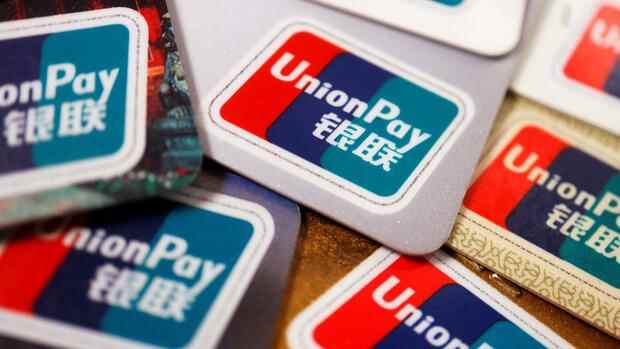With a transaction volume equivalent to around 150 billion US dollars, Unionpay was the second largest payment network in 2020.
(Photo: Reuters)
Beijing After the withdrawal of Mastercard and Visa from Russia, Russian banks increasingly want to switch to the Chinese bank card provider Unionpay. Russia’s largest financial institution Sberbank as well as Alfa Bank and Tinkoff announced this on Sunday.
Unionpay is already widespread in Russia: According to the company, the provider’s cards are accepted at 85 percent of all ATMs and credit card readers in shops, supermarkets and restaurants. The largest Russian e-commerce provider Ozon has also been enabling payments via Unionpay since mid-2021.
Unionpay is an association of banks in China that issue credit cards. According to its own information, it has more than nine billion cardholders worldwide and is accepted by more than 2,500 partners in 180 countries. With a transaction volume equivalent to around 150 billion US dollars, Unionpay was the second largest payment network after Visa in 2020.
However, a large part of this is accounted for by debit card transactions within China. However, Unionpay wants to expand internationally. According to the company, credit cards from the provider can only be applied for in Asia and Russia from Chinese banks and their local partner banks. Unionpay also cooperates with Mastercard and Visa.
Top jobs of the day
Find the best jobs now and
be notified by email.
In Russia, Unionpay already counts the most important banks Sberbank, VTB-Bank, Gazprombank and other financial institutions among its partners. At the end of December, one of the largest private financial institutions in Russia, the Russian Standard Bank, announced closer cooperation with Unionpay. This allows money to be transferred to Unionpay cards from foreign banks. “A new, convenient service for cross-border money transfers,” the press release said.
In this context, it will be interesting to what extent Unionpay will enable Russian customers in future to access assets in Russia from abroad, or from Russia to assets abroad. Cross-border money transactions of this kind would probably only violate sanctions if companies or people using the cards were on the West’s list of sanctions. Since 2015, cash withdrawals abroad via Unionpay for customers of Chinese financial institutions have also been limited to the equivalent of just under $16,000 per year and 1,600 per day.
Mastercard and Visa credit cards issued in Russia can still be used domestically
The US credit card companies Mastercard and Visa announced their withdrawal from Russia on Sunday. By shutting down business, US companies are going beyond the measures required by Western financial sanctions. They justified the move with the Russian invasion of Ukraine.
In return, Russia’s central bank will ban the use abroad of Mastercard and Visa credit cards issued by Russian banks from March 9. She advised Russians currently out of the country to withdraw cash before the ban comes into effect.
Within Russia, Mastercard and Visa credit cards issued by Russian banks will still be accepted until the end of their term. The central bank also pointed out that Russian banks are now increasingly using the Chinese Unionpay system, which is linked to the Russian payment system Mir.
>>> Also read: Protective shield against sanctions – How China could support the Russian financial system
Apparently, meanwhile, concern is growing in the People’s Republic of how badly China’s banks are suffering from the Ukraine war and the associated sanctions. China’s State Foreign Exchange Service (SAFE) has asked banks about their potential exposure to the Russia-Ukraine crisis, insiders told Reuters on Monday.
It was about doing business with Russian financial institutions and dealing with risks. The topic was also a possible extension of sanctions to banks in the People’s Republic and preparations for such scenarios.
The Chinese government has repeatedly condemned sanctions against Russia and called them illegal. However, China’s four largest banks have adhered to previous US sanctions against Iran and North Korea, for example, because they need access to the US dollar clearing system, reports Bloomberg news agency, citing insiders.
More: World’s largest credit card issuers suspend business in Russia
